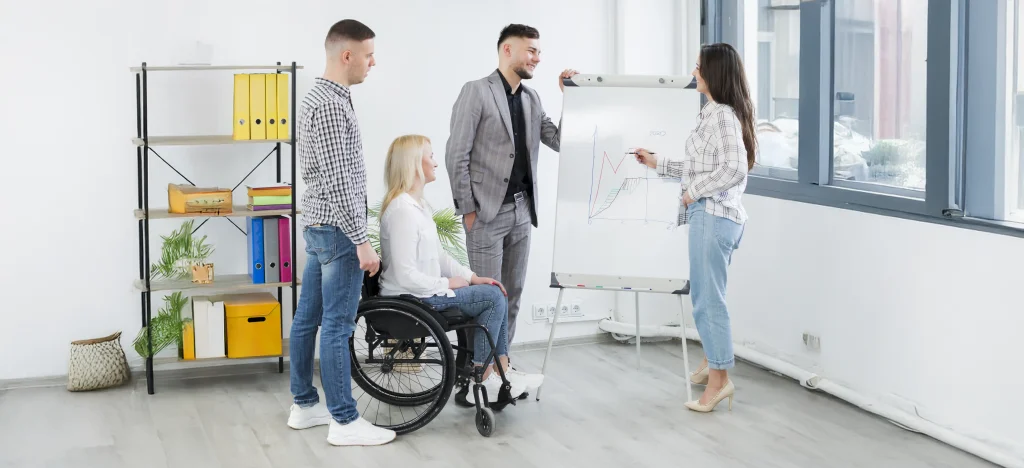Access to healthcare, education, and mobility aids forms the foundation for every child’s well-being. For specially abled children in rural UK communities, such as those in remote areas of Wales or the Scottish Highlands, these essentials are often limited, making daily life a challenge. High-traffic searches like “specially abled support for children,” “vocational training for specially abled,” and “empowering specially abled kids” reflect the urgent need for inclusive programs.
Narayan Seva Sansthan UK, a leading charity for specially abled children, bridges this gap through life skills and vocational training like mobile repairing, sewing training, and computer classes. These initiatives help specially abled children discover strengths, build independence, and pursue sustainable livelihoods—turning charity near me into true empowerment.
Key Components of a Life Skills and Vocational Curriculum for Specially Abled Children
A comprehensive curriculum combining life skills and vocational training equips specially abled children to navigate physical, emotional, and economic challenges. Designed for resource-scarce rural UK settings, it emphasizes inclusivity and hands-on learning. Below are the core components, with examples of how children grow:
Self-Awareness
Stigma in rural UK communities often erodes identity for specially abled children. Adaptive art and sensory activities in life skills sessions encourage reflection, helping children recognize their unique abilities and build pride in their resilience.
Emotional Regulation
Without access to counseling, specially abled children internalize frustration from exclusion or health challenges. Mindfulness exercises and emotion-mapping tools (e.g., picture cards for nonverbal kids) teach coping strategies, boosting self-worth and stability.
Social Skills
Isolation is common in rural UK areas lacking inclusive spaces. Adapted team games, like wheelchair-based group activities, foster teamwork and leadership, helping specially abled children advocate for their needs and combat loneliness.
Communication Skills
Limited interaction opportunities hinder expression. Sign language games, voice-assisted storytelling, and peer dialogues enhance verbal and non-verbal communication, building confidence for school and community engagement.
Problem-Solving and Critical Thinking
Resource constraints limit cognitive growth opportunities. Hands-on challenges, like designing simple aids with recycled materials, teach analysis and innovation, turning obstacles like navigating uneven rural paths into solvable problems.
Empathy Building
Specially abled children may struggle to understand others’ perspectives amid their challenges. Role-playing with props (e.g., simulating hearing loss) and group reflections promote kindness, strengthening relationships and community ties.
Financial Literacy and Basic Math Skills
Rural UK families often lack financial education, leaving specially abled children unprepared for independence. Simulations like budgeting for “aid appliances” using play money teach saving, earning, and numeracy, aligning with searches like financial help for specially abled children.
Vocational Training: Mobile Repairing
Mobile repairing courses teach specially abled children to diagnose and fix basic smartphone issues, using adaptive tools for those with mobility challenges. These skills open doors to local job markets, fostering financial independence and aligning with high-demand searches like vocational training for the specially abled.
Vocational Training: Sewing Training
Sewing classes, adapted with foot pedals or hand-operated machines, empower specially abled children to create garments or repair clothes. This practical skill supports entrepreneurship or employment in rural UK tailoring shops, resonating with specially abled support for children.
Vocational Training: Computer Classes
Basic computer classes, using accessible software and voice commands, teach typing, data entry, and digital literacy. These skills prepare specially abled children for remote work or office roles, tapping into searches for empowering specially abled kids through tech.
How Life Skills and Vocational Training Help Specially Abled Children Overcome Challenges in Rural Areas
Rural specially abled children in the UK face barriers like inaccessible schools, poverty-driven pressures, or delayed therapies. First-generation learners or those post-surgery often doubt their potential. Life skills and vocational training address these challenges:
Helps Children Process Trauma Through Creative Expression
Post-surgery or accident recovery leaves emotional scars. Adaptive arts—like drawing with mouth sticks or digital storytelling—offer a safe outlet, reducing anxiety and aiding healing.
Acts as an Icebreaker to Ask for Help
Fear of rejection silences many. Fun, low-pressure games and vocational workshops build trust, encouraging specially abled children to share needs like prosthetic limbs for kids with peers and mentors.
Fosters Peer Bonding in a Non-Judgmental Space
Inclusive collectives with activities like adapted sports or group sewing projects create judgment-free zones. Specially abled children form friendships, honing social skills free from ableist pressures.
Supports Education Retention and Reintegration
Life skills and vocational classes make learning accessible and engaging, using tools like braille games or computer tutorials. This motivates school return, reducing dropout rates in rural UK schools.
Sparks Future Aspirations Beyond Survival
Vocational skills like mobile repairing or computer literacy inspire careers as technicians, tailors, or digital professionals, shifting focus from mobility to meaningful goals.
How Narayan Seva Sansthan UK’s Projects Are Making a Lasting Difference Through Life Skills and Skill Development
Narayan Seva Sansthan UK extends its global mission—delivering thousands of free corrective surgeries and aids—to empower rural specially abled children through life skills and vocational training. These programs instill responsibility, identity, and hope. Here’s how they make an impact:
Engaging Children Through Adaptive Sports
Inclusive sports like wheelchair basketball or para-athletics, led by staff, build physical confidence and belonging. Top performers advance to regional UK events, aligning with searches for sports for specially abled children.
Creating Customised Learning Materials
At Child Activity Centers, kids co-design Teaching Learning Materials (TLMs) like large-print math kits or audio aids for computer classes, fostering ownership and interactive learning.
Involving Children in Advocacy Campaigns
Specially abled children craft posters against stigma or slogans for inclusion, raising awareness about issues like child trafficking. Supported fully, they gain advocacy skills and a community voice.
Organizing Inclusive Special Events
Specially abled children lead festivities for days, like Specially Abled Awareness Month or UK-specific events like Remembrance Day, collaborating with therapists on community health days. This teaches event planning and civic engagement.
Providing Vocational Training for Sustainable Futures
Narayan Seva UK offers mobile repairing, sewing training, and computer classes tailored for accessibility. Mobile repairing workshops teach troubleshooting with adaptive grips, sewing classes use modified machines, and computer training includes screen readers, preparing specially abled children for local or digital jobs.
Through these efforts, Narayan Seva UK has supported numerous specially abled children, providing free digital schooling, uniforms, health support, and vocational training—proving life skills and practical trades turn vulnerability into opportunity.
Conclusion
Medical aid like free prosthetics is vital, but combining life skills with vocational training like mobile repairing, sewing, and computer classes ignites true empowerment for rural specially abled children in the UK. These programs enhance education retention, foster independence, and open career paths.
Searches for the best charities for specially abled children and vocational training for the specially abled highlight the demand for such impact. Yet, many still await their chance to thrive. Support Narayan Seva Sansthan UK to fuel surgeries, skills, and dreams. Together, let’s empower every specially abled child to soar. What skill do you think transforms lives most?








